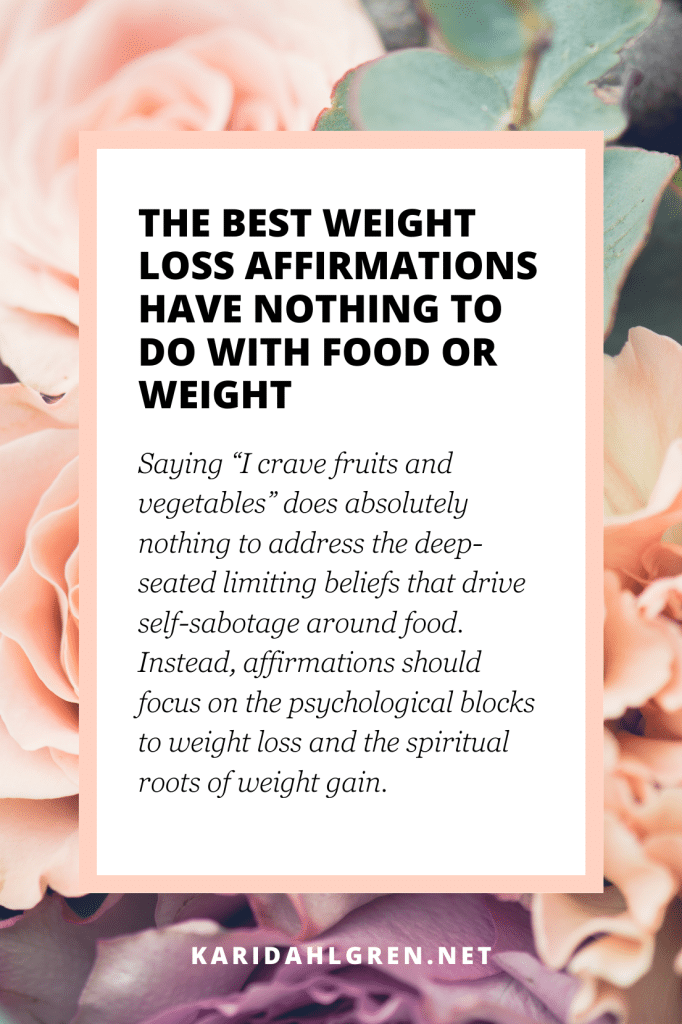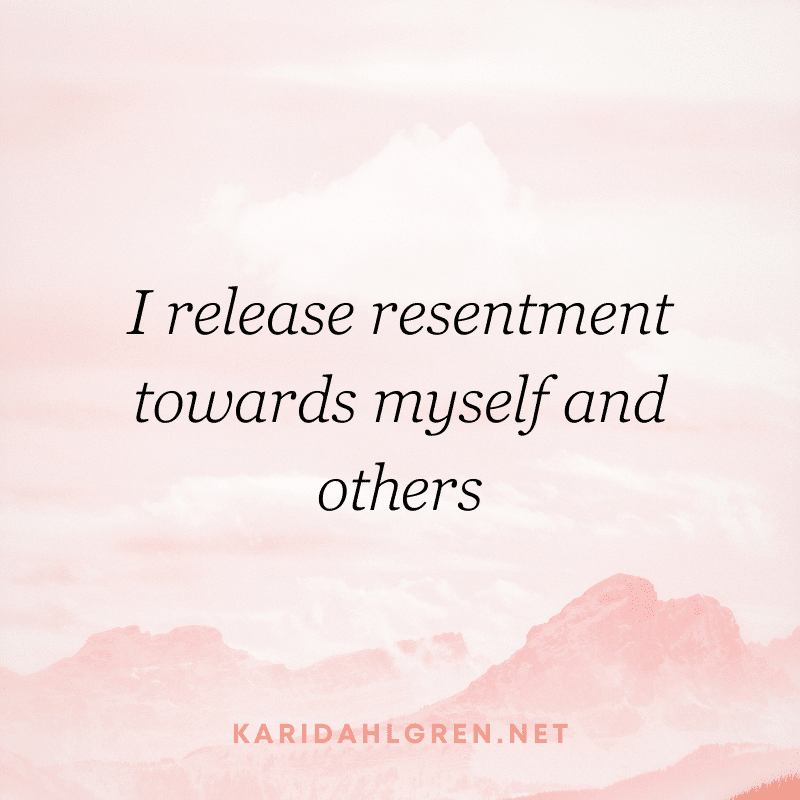
Weight loss affirmations are a hit-or-miss, in my opinion. Some are a Band-Aid that don’t address the real issue, but others are quite useful—and honestly changed my life.
Today I’m talking about the weight loss affirmations that helped me early on in my journey to stop binge eating. I actually didn’t use them with the intention of weight loss, but as I continued to explore the intersection between spirituality and eating psychology, I can see how it’s all connected.
I am passionate about these weight loss affirmations because they aren’t explicitly related to weight loss, and that’s what makes them powerful. Saying weight- or food-specific things like “I crave fruits and vegetables” doesn’t really do much for you. It’s not overriding any specific limiting belief.
The weight loss affirmations listed below, however, are all intentionally designed to target some of the deepest limiting beliefs that trigger self-sabotage around food and weight. I hope some of them resonate with you like they did for me.
The Inspiration for My Weight Loss Affirmations
Before we dive in, I’d like to introduce you to the woman who inspired many of these weight loss affirmations: spiritual thought leader Louise Hay. I discovered her back in 2016, which just so happened to coincide with the year that I gave up dieting and started exploring the psycho-spiritual path towards healing my relationship with food.
I read her book You Can Heal Your Life and it made a lasting impression on me—so much that it has remained on my list of the best self-help books for weight loss even though it isn’t about weight loss specifically. Instead, it explores a concept that permeates every aspect of our lives, including our relationship with food: self-love.
In You Can Heal Your Life, Louise Hay presents a radical concept: Every single problem we face can ultimately be traced back to a lack of self-love — including health and weight problems. While this is a radical idea, I have personally found it to ring true.
Louise Hay is, from what I know, the pioneer of the metaphysical causes of physical ailments, or the “spiritual root” of physical ailments. For example, the spiritual root of weight gain is believed to stem from a deep-seated need for protection.
Our body fat serves an important purpose in our lives, and protection from starvation is one of those purposes. However, in the metaphysical sense, the benefits of body fat extend far beyond the purely physical benefits of survival and also express a spiritual need.
Your weight loss affirmations need to address your unique spiritual needs.
The Best Weight Loss Affirmations Don’t Mention Food or Weight
Most mainstream weight loss affirmations fall flat because they only address the surface level of food and exercise. For example, some suggested affirmations for weight loss are “Exercise makes me feel good” or “My body craves whole foods”… What exactly is that doing?
The best weight loss affirmations address the limiting beliefs that keep us stuck in the first place. They don’t focus specifically on weight. Instead, they should focus on most common psychological blocks to weight loss and how to release them.
Your weight loss affirmations should also address the spiritual roots of weight gain, too. That way, you’re addressing the beliefs below the surface—out of sight but not out of mind—that impact your relationship with food. Here are some weight loss affirmations that explore the psycho-spiritual realm:
The intersection between eating psychology and spirituality is my jam. Learn more in my free ebook The Spiritual Seeker’s Guide to Stop Binge Eating. If you’re into affirmations, you’ll LOVE my ebook.
“I love myself”

This was the original affirmation from You Can Heal Your Life that made the biggest impact on my life back in 2016—and it wasn’t easy. Louise Hay recommends saying affirmations to yourself in the mirror, and I didn’t expect it to be so hard to say “I love myself” in front of the mirror. It felt weird, and that made me feel even more weird!
Why was it so hard to tell myself I love myself? In hindsight, the answer is somewhat apparent: because diet culture has shamed overeaters out of their worthiness. We live in a culture that equates thinness with worthiness and this creates an intense drive towards thinness in order to gain worthiness. Without thinness, it’s hard to feel deserving of even the most basic human needs—like love. Oof.
A lack of self-love is one of the reasons why so many of us look in the mirror and, instead of saying ‘I love myself,’ we mutter phrases along the lines of ‘gosh I feel so fat and ugly.’ Unfortunately, when we repeat phrases like this to ourselves over and over, it has the same effect as an affirmation! Only with a negative tune.
We need to tell ourselves that we love ourselves in order to overcome the damage we have done with critical and negative self-talk. It can be difficult and even weird to say “I love myself” while looking in the mirror, but just give it a shot. The weirder it feels, the more you need it.
Self-love is not the result of weight loss—it’s the path. We can’t wait until we’re thin to love ourselves because, to quote Geneen Roth, who we are on the way there is who we will be when we get there.
“I approve of myself”

Louise Hay identified self-rejection as one of the metaphysical causes of stubborn weight. Self-rejection is similar to a lack of self-validation, which can cause us to seek external validation from others instead of ourselves. I certainly used to seek validation from those around me because I could not give it to myself.
Of course, these were not my thoughts at the time. I just thought I needed to diet and get skinny to solve my problems. I have learned so much in the last decade unpacking my limiting beliefs around food, weight, and everything in between. Self-approval paves the way to freedom from other peoples’ opinions.
“I am willing to forgive”

Sometimes stubborn weight is symbolic of a resistance to forgiveness. Can you reflect back on your life and list at least one person that you hold a grudge against? If so, it marks a profound place to start healing—a process that may help you on your weight loss journey.
This affirmation will not magically make you forgive this person, and it definitely won’t make forgiveness easy. However, it will “loosen up” your readiness to forgive and therefore some readiness to let go of extra weight.
When we’re rooted in thoughts governed by grudges and vindictiveness, it’s hard to access forgiveness. But when we root ourselves in better thoughts, it makes forgiveness more accessible, and that’s quite a benefit from a simple affirmation.
“I am willing to feel uncomfortable”

While this affirmation might seem like an ask for trouble, it directly addresses what I personally believe is the main driver of compulsive eating: uncomfortable emotion. In fact, though it is my personal theory, the link between trapped emotions and weight gain is widely known.
Many of us have been trained to resist negative emotion. Whether it was our parents teaching us to keep a stiff upper lip or society at large painting happiness as the emblem of success, somewhere along the way we became resistant to unhappiness.
My Stop, Drop, & Feel method for stopping compulsive eating is rooted in the practice of making space for edgy emotions. In the precise moment where we want to eat without hunger is a feeling that we are resisting—either consciously or unconsciously. When we train in feeling these edgy feelings head-on, we develop tolerance for discomfort, or what I call emotional tolerance. This weight loss affirmation is a reminder of this practice.
“I am willing to upset other people” (a weight loss affirmation for people pleasers)

This weight loss affirmation seems like a bad idea, doesn’t it? But that’s because it’s not meant for everyone! I only included this in my list of weight loss affirmations because it’s necessary for people pleasers. Those of us who compulsively need to please the people around us often reach for food for the energy to people-please or to buffer the emotions that bubble up from too much people-pleasing like resentment, exhaustion, etc.
Many of us are afraid of becoming horrible people when we say we are willing to upset other people, but people-pleasers are already too far in the extremity of hyper-niceness. When someone that’s hyper-nice becomes a little more willing to upset other people, they just become nice—and they buffer a little bit less with food as a result.
“I release resentment towards myself and others”

Hidden anger is believed to be another spiritual underpinning of weight gain. When we suppress our anger, it leads to emotional eating; and when we feel resentful towards others, we end up bearing the brunt of that anger—and it has little if not zero effect on the person we hold anger towards!
In order to release the extra weight, we need to be willing to let go of our grudges, anger, and resentment. If weight is our protection, we cannot let it go until we let go of the things we believe we need protecting from. If this weight loss affirmation doesn’t resonate with you but the idea of hidden anger does, try to rephrase it in a way that empowers you to let go.
“I trust myself”

Self-trust is at the core of healing your relationship with food. Diet culture diminishes our self-trust by teaching us that we cannot trust our bodies and that we must rely on an external set of rules to manage our weight. But diets don’t work and only lead to weight cycling (continuously gaining and losing weight) and a dead end.
When I first started using the self-trust affirmation, it had a profound effect on my body. I actually made a YouTube video about it. (Keep in mind, this is my oldest video filmed all the way back in 2018!)

I was at the gym when I first started using this affirmation. It wasn’t quite a weight loss affirmation but it was during the era where I was exploring avenues to reaching my natural weight beyond dieting. I noticed that whenever I would say “I trust myself” in my head, my coordination would improve.
My movements at the gym would be stronger, better, and more coordinated the more I leaned into self-trust. This was a pivotal moment in my journey, where I saw with my very own eyes the difference that affirmations can make and the importance of self-trust.
“I live my life authentically, open to all emotions”

When we insist that life be happy all the time, we end up creating more misery during the times where life is authentically uncomfortable but we resist it. When we resist unhappiness, we end up having an even worse time because of it—and then we pile on top of the misery with overeating.
Several years ago, I let go of the goal of having a happy life. Instead, I set my sights on a better goal for myself: an authentic life. I realized that, no matter how much I pushed for total happiness, life always turned out to be just about 50/50 good and bad no matter how hard I tried.
When I started practicing the Stop, Drop, & Feel and really opening my eyes to my authentic discomfort, I noticed that life was still 50/50 good and bad—but I wasn’t overeating! To me, this is the better problem to have, and that’s why authenticity is the last (but not least!) weight loss affirmation.
Weight Loss Affirmations Should Address Your Psychology & Spirituality, Not Food
Weight loss affirmations that simply involve the surface-level of food and weight don’t really do much. Saying “I love eating healthy food” doesn’t address a single limiting belief. Instead of using weight-specific affirmations, I encourage you to try some of the affirmations I listed here, which delve into the psycho-spiritual underpinnings of overeating and weight cycling.
If you’ve enjoyed this post and resonate with my message, then you will LOVE my free ebook about the intersection between eating psychology and spirituality. It’s titled The Spiritual Seeker’s Guide to Stop Binge Eating, and you can download it for free below.




This is wonderful! Definitely going to try this. Do you mind sharing how much you lost and within hours much time? Hearing the physical affects are inspiring to hear ????
Louise Hay’s methods helped me to heal my hypothyroidism. Doctors told me that I’d have to take the medication for the rest of my life. Long story short, 6 months of Louise Hay while weaning off of the medication, worked! A year later, blood work test results showed my thyroid was normal, and has been ever since! I tell everyone it’s worth trying under proper supervision.
This is a really cool share! Oh the power of affirmations. I don’t weigh myself though so I can’t say how much I lost 🙂
Wow, isn’t this a synchronicity? I have that book, I’ve read it several times and I love it. I agree with everything that you say! And now that I am once again trying to lose weight and looking for tools to help me, I’m being reminded that self-love is key. <3 Thank you!
Ohhhh synchronicity is such confirmation that you’re on the right path. I love this!! <3